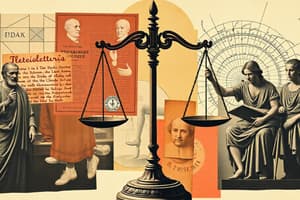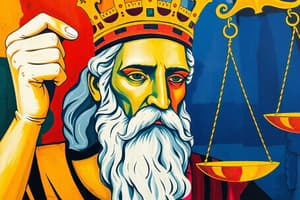Podcast
Questions and Answers
What are the three types of good categorized by Socrates?
What are the three types of good categorized by Socrates?
- Good for their own sake only, 2) Good for their own sake and their consequences, 3) Good only for their consequences.
What challenge does Glaucon pose regarding the nature of justice?
What challenge does Glaucon pose regarding the nature of justice?
Glaucon challenges Socrates to prove that justice is intrinsically valuable and not just valuable for its consequences.
Explain the thought experiment of the Ring of Gyges and its implications for justice.
Explain the thought experiment of the Ring of Gyges and its implications for justice.
The Ring of Gyges allows one to be invisible and avoid consequences, suggesting that people act justly only out of fear of punishment.
Describe the comparison made between the perfectly just man and the perfectly unjust man.
Describe the comparison made between the perfectly just man and the perfectly unjust man.
What is Plato's view on justice in relation to the soul's parts?
What is Plato's view on justice in relation to the soul's parts?
Why does Plato argue that justice is intrinsically valuable?
Why does Plato argue that justice is intrinsically valuable?
What is a critique mentioned about Plato's analogy between the city and the soul?
What is a critique mentioned about Plato's analogy between the city and the soul?
How does Glaucon's argument reflect on the nature of human behavior concerning justice?
How does Glaucon's argument reflect on the nature of human behavior concerning justice?
According to Plato, why ought one to be just?
According to Plato, why ought one to be just?
What is Hobbes's primary rationale for why individuals should be just?
What is Hobbes's primary rationale for why individuals should be just?
How do Plato and Hobbes differ in their understanding of justice's value?
How do Plato and Hobbes differ in their understanding of justice's value?
What is the 'Fool's Objection' in Hobbes's philosophy?
What is the 'Fool's Objection' in Hobbes's philosophy?
Contrast Hobbes's and Rousseau's views on the state of nature.
Contrast Hobbes's and Rousseau's views on the state of nature.
What is Nietzsche's interpretation of the good/bad distinction?
What is Nietzsche's interpretation of the good/bad distinction?
How does Nietzsche explain the transformation of morality from good/bad to good/evil?
How does Nietzsche explain the transformation of morality from good/bad to good/evil?
What role does the will to power play in Nietzsche's philosophy?
What role does the will to power play in Nietzsche's philosophy?
Why does the author find Rousseau's view more compelling than Hobbes's?
Why does the author find Rousseau's view more compelling than Hobbes's?
What key implication does Nietzsche draw about moral values?
What key implication does Nietzsche draw about moral values?
Flashcards
Intrinsic Value
Intrinsic Value
Value derived from something being good in itself, independent of its consequences.
Instrumental Value
Instrumental Value
Value derived from something being good for its consequences, even if it isn't inherently good.
Glaucon's Challenge
Glaucon's Challenge
Glaucon argues that people only act justly because they fear punishment, not because justice is inherently good.
Ring of Gyges
Ring of Gyges
Signup and view all the flashcards
Just Soul
Just Soul
Signup and view all the flashcards
Unjust Soul
Unjust Soul
Signup and view all the flashcards
Plato's Response
Plato's Response
Signup and view all the flashcards
City-Soul Analogy
City-Soul Analogy
Signup and view all the flashcards
Plato's view of Justice
Plato's view of Justice
Signup and view all the flashcards
Hobbes' view of Justice
Hobbes' view of Justice
Signup and view all the flashcards
The Fool's Objection
The Fool's Objection
Signup and view all the flashcards
Hobbes' response to The Fool's Objection
Hobbes' response to The Fool's Objection
Signup and view all the flashcards
Rousseau's State of Nature compared to Hobbes's
Rousseau's State of Nature compared to Hobbes's
Signup and view all the flashcards
Rousseau's political theory
Rousseau's political theory
Signup and view all the flashcards
Nietzsche's Master Morality
Nietzsche's Master Morality
Signup and view all the flashcards
Nietzsche's Slave Morality
Nietzsche's Slave Morality
Signup and view all the flashcards
Nietzsche's Will to Power
Nietzsche's Will to Power
Signup and view all the flashcards
Nietzsche's view on Morality
Nietzsche's view on Morality
Signup and view all the flashcards
Study Notes
Glaucon and Adeimantus' Challenge
- Glaucon and Adeimantus challenged Socrates' view of justice.
- They questioned if justice is intrinsically rewarding or if it's merely beneficial for consequences.
- They presented a tripartite classification of value: things good in themselves, things good for consequences and themselves, and things only good for their consequences.
- They argued justice falls into the second category, but most people see it as valuable only through consequences.
- The "Ring of Gyges" thought experiment illustrated this point. If someone could act unjustly without consequence, they likely would, suggesting justice is driven by fear of punishment, not an intrinsic worth.
The Value of Justice
- A just person may suffer when perceived as unjust, and an unjust person may prosper when perceived as just.
- This challenges the idea justice is intrinsically valuable, independent of results.
- Plato responded that a just soul is harmonious, and this internal harmony brings happiness, regardless of external consequences.
- Plato argued that justice in the soul arises by properly ordering its three parts: reason, spirit, and appetite.
Plato vs. Hobbes on the Ought
- Plato: Justice is intrinsically valuable; properly ordering the soul leads to happiness, and justice is constitutive of human excellence.
- Hobbes: Justice is instrumentally valuable; it's about keeping covenants and following social contracts, avoiding the state of nature.
Hobbes's Perspective
- Hobbes viewed human nature as self-interested and competitive, emphasizing the role of self-preservation.
- Rationality is about pursuing self-interest, and morality/justice exists to achieve mutually beneficial arrangements.
- Hobbes believed political stability necessitates enforcing contracts, as violating covenants risks exclusion and a return to the chaotic state of nature.
- He argued that rational beings would not violate social rules, because being caught and excluded from mutual arrangements would lessen their likelihood of survival.
Rousseau vs. Hobbes
- Hobbes' State of Nature: Nasty, brutish, and short; constant conflict.
- Rousseau's State of Nature: Peaceful and primitive, humans naturally good and corrupted by society.
- Hobbes: Advocated strong absolute sovereignty to maintain peace.
- Rousseau: Advocated direct democracy to preserve natural freedom.
- Hobbes' Political Theory: Government's role is maintaining peace.
- Rousseau's Political Theory: Government expresses the general will, promoting virtue.
Nietzsche's Perspective
- The initial distinction "good/bad" reflected noble strength and power versus common weakness.
- "Good/evil" emerged from ressentiment, where the weak inverted the strong's values.
- This inversion created modern moral frameworks where weakness is virtuous and strength is cast as evil. The will to power, the fundamental drive to express dominance, underlies this transformation.
- Morality, for Nietzsche, is not objective truth, but a human construct, shaped by power dynamics.
Studying That Suits You
Use AI to generate personalized quizzes and flashcards to suit your learning preferences.




